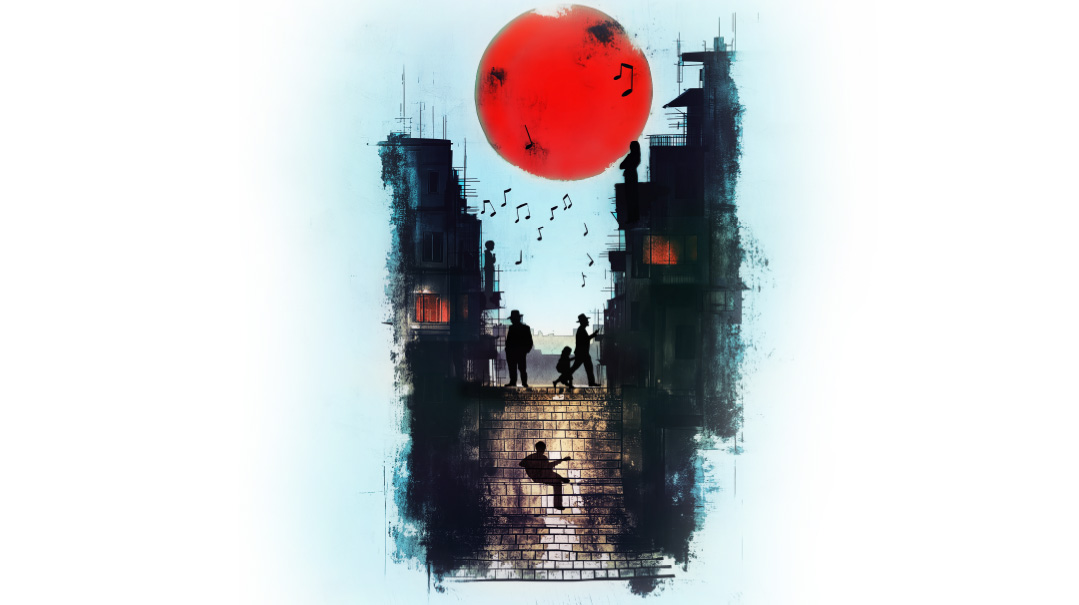Last Stop: Chapter 8
| April 3, 2023“You’re always trying to help,” Chana snaps. “You’re so convinced that we need help.” Her voice rises, hoarse and frustrated and defensive

Eliezer is trapped. Back against the wall, no escape to either side, trapped. There is no graceful way to escape this situation, no weak link that might spare him. He’s traveled for three hours to make it here, and he wonders if he will ever make it home.
For now, he is forced to smile and nod as his sister’s next-door neighbor talks his ear off. “And she told me that Hillel had no other options, and I said absolutely not,” the man says, smacking his lips as he speaks. “I said I know Rabbi Hartman from Ohr Gershon, and I said I know he’ll be at his nephew’s bar mitzvah next week, and he owes me a favor.”
He takes a drink of seltzer and another step forward, far too close to Eliezer. “I said, I put him and his family up for the last bar mitzvah two years ago, and we were instant friends, weren’t we?”
Eliezer finds a smile, stiff and a little unpleasant. It’s a tactic to put distance between them. “I’m afraid I’m not very involved in mesivta admissions,” he says. Very is doing a significant amount of work in that sentence. “I’m happy to put in a good word for your cousin’s son, though.”
“You’re a good man, Eliyahu Hartman,” the man says, clapping him on the shoulder. Unbidden, Eliezer’s eyes flicker to the other side of the drinks table, where Naftali is lingering. There had been a time when they’d both be amused at the people Eliezer attracts at events like these, when Naftali would be the one to disengage him from the awkward conversation. Family events have always been the one place where Eliezer and Naftali have leaned on each other for support, two brothers on semi-equal footing.
Not this time. Eliezer turns away from Naftali deliberately, and he manages to extract himself from the seltzer-drinking neighbor on his own. Naftali hasn’t looked in his direction once.
Naftali is good at disappearing in a crowd. It’s an old skill from when he’d been young. He’d disappear into their room after dinner, easily forgotten until long past bedtime. Eliezer only notices him because it’s his job, as integral to his life as Modeh Ani in the morning. He watches over Naftali.
Naftali is a good person, but he isn’t strong or charismatic or sharp enough to endure in a world that can be hard on good people. Eliezer wonders what kind of poison Yudi Stein has been dripping into his ears, day after day, on that quiet bus ride out to Meadowbrook.
He pushes it from his mind and returns to the simchah-goers still thronging around him. In his early years at Ohr Gershon, he’d struggled not to let the kavod get to his head. By now, it is less about ego and more about expectation. He will be recognized, he will be approached, he will be treated differently than others. It isn’t something that he wants, but when it’s absent, he feels a strange emptiness in his gut, a sense that things aren’t as they should be.
He wonders if Naftali sees him as drunk on his own importance, leagues above everyone else. He wonders if Naftali sees him as a burden, a bar set far too high for Naftali’s capacity to reach. He wonders if Naftali thinks about him at all, or if this, too, is his ego at work.
Beyond the well-wishers is Eliezer’s father, standing near the bar mitzvah boy, and Eliezer moves to him. “Mazel tov, Daddy,” he greets him. “Our first family bar mitzvah.”
“It’ll be a while until the next,” Daddy says, glancing over to the mechitzah that separates the women from them. “No shortage of bas mitzvahs, though.”
“Never,” Eliezer agrees wryly. “At least with those, I usually get to escape to the beis medrash when the dancing starts.”
Daddy laughs. “How’s the yeshivah?” he asks. He always asks after the yeshivah, as though it is a grandchild he rarely gets to see. Eliezer’s father is an attorney who can only manage a daf yomi shiur, but he brims with pride when it comes to the yeshivah. Eliezer only disappoints him in one area — “And how is Naftali?”
“You can ask him,” Eliezer says, gesturing across the room. “He’s right here.”
Daddy frowns, reproof in his tone. “Eliezer. You don’t think he seemed down? Naftali struggles, you know that.” He glances at Naftali, the dissatisfaction on his face carving its way into Eliezer. “You’ve been looking after him?”
It’s not a question but an eternal expectation, written into Eliezer’s veins with blood, an inextricable part of him.
His father’s forehead creases when Eliezer doesn’t immediately respond.
“He’s doing well,” Eliezer says finally. “You know I keep an eye out for him.”
This is the worst event that Chana has ever attended. Nothing personal to her brother-in-law and sister-in-law, who have gone all out with the food and music. No, the problem is her company at the table: a dozen chattering cousins and Rivky, face like stone, sitting opposite her. They haven’t spoken since Wednesday night’s conversation, and Chana doesn’t intend to speak to her now.
She chats with some of the girls instead, who are oblivious to the tension between their mothers. “I thought you were going to be at that dinner last week!” Tehila says, pouting at her. “I came downstairs and looked all over for you.”
Chana runs a fond hand through her niece’s hair. “I had to run home,” she says. She’d dodged Rivky’s calls after that, had spoken to her just once about the bar mitzvah in a clipped voice that had made it clear that she’s angry.
Because she’s furious. It’s not Rivky’s fault, exactly, that Naftali can barely be in the same room as her right now. That Naftali keeps looking at her with that pained, dismayed gaze. That the suggestion that Chana had made to him had wounded him so badly that he won’t even talk to her about it.
It isn’t Rivky’s fault, except that she’d been the one who’d pushed it in the first place. And Chana might be angry with herself, but she has plenty of fury to direct at Rivky, too.
Rivky is always about good intentions. Rivky is always about something more. Sometimes Chana wonders if Rivky regrets setting her up with Naftali in the first place. Her fists clench under the table, and she takes her cup with a rigid hand.
Rivky sighs. “Chana,” she says.
Chana turns to Tehila. “You have the prettiest dress,” she says. “I remember when Aviva used to wear it, but she never paired it with that headband.”
“I picked out the headband at the store,” Tehila says, bouncing in her seat, and no one except Rivky notices that Chana has dodged her overture.
It’s a relief when the speeches begin and Chana has an excuse to turn away from Rivky. Eliezer speaks, of course, and Chana doesn’t clap for him. It’s solidarity with Naftali, she decides, though she’s sure that Naftali is applauding on the men’s side. Naftali is like that. It’s up to Chana to be fiercely furious for them both, even if Naftali had hardly spoken to her in the car on the way here.
The bar mitzvah is still going strong at nine o’clock, but that had been their limit for the night — the kids can sleep in the car, but Naftali wakes up too early to be in bed later than midnight. Chana collects the girls and meets Naftali and Ari outside in the lot.
Of course, it’s too much to expect that she hadn’t been followed.
Rivky stands in front of the row of cars opposite Chana’s minivan, her arms crossed loosely in front of her, and Chana turns deliberately from her and focuses on squeezing the little ones into the car.
“You can go talk to her. I’ll buckle Shira in,” Naftali says, his voice still distant and cool.
“I don’t want to talk to her,” Chana mutters, but Rivky is moving closer, and Chana is stricken with the sudden realization that this will be so much worse if Rivky starts this discussion again in front of Naftali. She moves across the lot to Rivky, already on edge.
“This is not the time,” she says.
Rivky is unimpressed. “You mean so you can avoid me for another week? I didn’t even know you were angry with me until you didn’t come back in at the dinner. I was trying to help —”
And there’s the anger, hot and seething when it’s been a dull ache until now.
“You’re always trying to help,” Chana snaps. “You’re so convinced that we need help.” Her voice rises, hoarse and frustrated and defensive. “Have I ever asked? Have I ever said anything to make you think that I’m not happy?
“Naftali loves driving that bus,” she says, and she knows, down to her core, that it’s true. That his job isn’t a concession, that he seems genuinely content after work in a way that he’d never been with his other jobs. She can’t say that she loves that he drives the bus, but she can say this. “He’s a wonderful father and husband, and I love that he’s doing something that he loves.
“Your idea of fulfillment isn’t mine. It’s nowhere near mine, and I can’t believe I ever got sucked into it —” She’s breathing hard, close to shouting, and Rivky presses her lips together and says nothing. “There is nothing wrong with Naftali’s job,” Chana says, and she makes her voice hard and steely, uncompromising, and feels for the first time in days like she’s done something right.
Rivky regards her silently, the skepticism still there. Chana is ready to fight again, but Rivky only says, her words careful, “Okay. That’s… that’s fair.”
She looks as though she might say something else, one final but if you change your mind — that will be so infuriating that Chana might break ties with her forever, but a quiet voice cuts in.
“Chana,” Naftali says, and Rivky’s mouth snaps shut.
He’s leaning against a sedan, watching them with unreadable eyes, and Chana turns and follows him in silence. They climb into the car with chattering children behind them, let them squabble until they drift off, one by one, and when the last of the children has finally fallen asleep, Naftali says, “Thank you.”
“Of course,” Chana says, shifting in her seat. “And I meant it. I know that this is… this is something you love. I didn’t want to take it away from you.”
“But you are worried.” Naftali says slowly. “This was all coming from Rivky in the first place, right?”
Chana nods.
“But — but you wouldn’t have listened to her if you weren’t worried.”
“I’m not…” Chana hesitates, and it feels like tough love again, telling him something he doesn’t want to hear. “I just keep thinking about Ari. How is he going to feel if you’re driving some of his classmates home next year?”
Naftali shrugs unhappily. “I’ll switch to a middle school afternoon route,” he concedes. “Or move out of the main school altogether. I prefer the preschool and the mesivta, anyway.”
“It’s not just that,” Chana says, and it hurts, pushing this out, expressing something that has only just begun to eat at her. “It’s all of it. The other boys are going to find out what you do eventually. And little boys can be cruel. And I also… I’ve been thinking about all the learning programs that they do, and the night seders, and I just…”
She rubs her eyes with the heel of her hand, smearing her makeup. “I want Ari to be able to sit and learn with you someday,” she whispers. “I want to know that you’re capable of it.”
They turn off the highway, and Naftali slows to a stop at a light. Together, they both twist around to look at their children. The older girls are in the back. Shira is asleep in her car seat, and Ari sits in the middle in his booster, his face serious even in slumber. He’s so small, and Chana already can sense that there’s something special about him. She wants to give him the world.
She knows that Naftali does, too.
“I’ll do my best,” he murmurs, the words like stones falling to the bed of a river. Each one lands with force, pulling his shoulders down a little lower, and Chana regrets having brought up any of this.
Even so, she can’t quite convince herself that she’d been wrong to share these hard truths.
to be continued…
(Originally featured in Mishpacha, Issue 956)
Oops! We could not locate your form.



